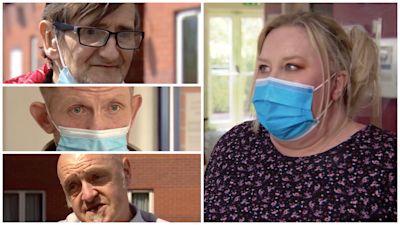'Grief' for support workers as Manchester 'homeless hotel' closes as a form of emergency accommodation

Video report by Emma Sweeney.
A hotel used to house the homeless during the coronavirus pandemic is closing its doors as a form of emergency accommodation - 15 months after first opening.
When the UK first went into lockdown in March 2020, the question of how to best protect those living on the streets was of national concern.
Many were worried about controlling a potentially deadly virus when some people did not have a home to go to, and nowhere to isolate in.
The government's answer came in the form of its Everyone In campaign, which enabled some hotels to be used as temporary housing, including the Holiday Inn Express in South Manchester.
For 15 months it has been used as a form of emergency accommodation - carried out by the Riverside charity.
Even when the government funding stopped, the council and combined authority stepped in by topping up housing benefit payments to keep the hotel open.
But now, bosses say the expensive model of care was only ever meant to be a short term solution, and instead they want to focus on moving people into permanent accommodation.
Staff say they are "grieving" the loss of the project, but
At the end of May the hotel will finally close its doors as a form of emergency accommodation, before re-opening again in June to the public.
WHAT DID IT PROVIDE?
Staff at the project provided so-called wrap around care, which meant that support services were provided on the hotel premises to enable residents to get their lives back on track.
For Simon Perry, that led to getting a replacement birth certificate and a new doctor.
Simon was one of 600 people to benefit from the project at the Holiday Inn Express.
Chris Whittles, another former resident, told Granada Reports how his appearance transformed during his two month stay.
Emma Sweeney: Catching up with the homeless hotel inhabitants
What happened to the homeless people who were moved off the streets in lockdown?
Riverside Service Manager, Cath Meegan, said: ''It feels really quite sad, sadder than I thought we would feel.
'It's now quiet, you know, we can feel the stillness. It was always really noisy and chaotic.
''And I've found we laugh because we've found ourselves late in the afternoon, before we all go home, reminiscing.
"Every day we seem to do it - we remember past residents, we remember things that happened at Christmas or Easter, or some of the visitors we've had here, and I think we're grieving a little.
''It was home and work wasn't it, this was a second home for us for 14 months, this was a family as well.
"The staff members are as much a family as our homeless community were, so I think we're in a grieving process right now."
In a statement Manchester City Council said: "The expansion of accommodation during the Covid pandemic was done to offer emergency support for people sleeping rough.
"It is not financially viable in the long run to fund this model of accommodation.
"The priority of MCC is to focus on moving people out of temporary accommodation into permanent accommodation.
"While expanding TA is useful, it does not provide a lasting solution."